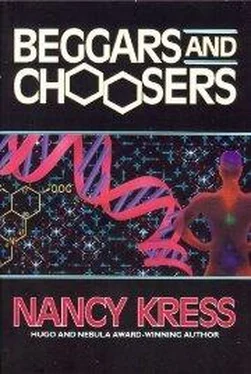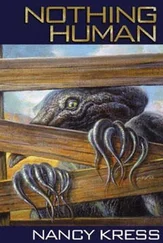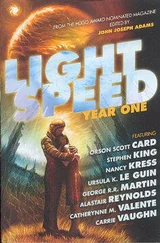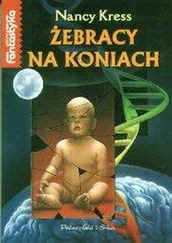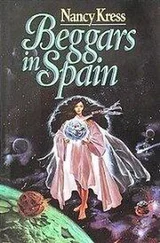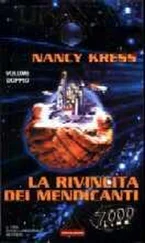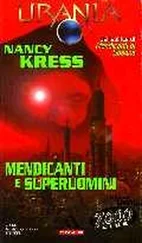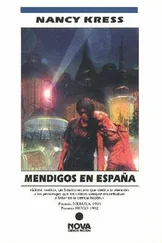But not once was an underground organization of nanotech saboteurs mentioned. Not once was the overground organization of Huevos Verdes mentioned. The SuperSleepless might not have existed. Nor Miranda Sharifi.
I walked over to the table of men in the corner. They looked up, not smiling. I wore purple jacks and genemod eyes. I didn’t even feel to see if there was a personal shield on my belt. There would be. Koehler wanted me alive; I was an expensive walking laboratory.
“You men know, you, where I can get to Eden?”
Two faces remained hostile. On the third, the youngest, the eyes nickered and the mouth softened at the corners. I spoke to him.
“I’m sick, me. I think I got it.”
“Harry — she’s genemod, her,” the oldest man said. Nothing in his voice showed fear of infection.
“She’s sick,” Harry said. His voice was older than his face.
“You don’t know who—”
“You go to the sunshine machine by track twelve, you. A woman’s there with a necklace pounded like stars. She’ll take you to the Eden, her.”
“The” Eden. One of many. Prepared for in advance by Huevos Verdes: technology, distribution, information dissemination, all of it. And the Liver security, if you could call it that, consisted only of Harry’s companions’ mild discouragement, which meant the government wasn’t interfering. I felt dizzy.
On the long walk to track 12,1 saw only fourteen people. Two of them were donkey techs. I saw no trains leave the station. A cleaning ’bot sat immobile where it had broken down, but there were no soda cans, half-eaten sandwiches, genemod apple cores, soysynth candy wrappers on the ground. Without them, the station looked donkey, not Liver.
A middle-aged woman sat patiently on the ground by the sunshine machine. She wore blue jacks and a soda-can necklace, each soft metal lid bent and pounded into a crude star. I planted myself in front of her. “I’m sick.”
She inspected me carefully. “No, you’re not.”
“I want to go to Eden.”
“Tell Police Chief Randall if he wants, him, to shut us down, to just do it. He don’t need no donkeys pretending to be sick, them, when you ain’t.” The woman said this mildly, without rancor.
“Down the rabbit hole,” I said. “ ‘Eat Me,’ ‘Drink Me.’ ” To which she naturally did not respond at all.
I walked to a gravrail monitor and asked it for information about train departures. It was broken. I tried another. On the fourth try, a working monitor answered me.
Track 25 was in another section of the station. There was more activity here, although not more garbage on the ground. Three techs worked on a small train. I sat cross-legged on the ground, not speaking to them, until they’d finished. They repaired only this one train, then left, looking tired. Colin Kowalski and Kenneth Koehler had known where I would go.
I was the only passenger. The train was direct. It was just barely the beginning of sunset when I stepped off onto the deserted main street of East Oleanta.
Annie’s apartment on Jay Street was empty, the door ajar. Nothing had been taken. Not the ugly garish wall hanging, not the water buckets, not the plasticloth throw pillows, not Lizzie’s discarded doll. I went in and lay down on Lizzie’s bed. After a while I walked to the Cafe.
Nobody was there, either. The foodbelt was stopped and empty, the holoterminal off. The Cafe hadn’t been trashed. It had just been evacuated, like the rest of the town. The government wanted everything extraneous cleared out for a while, which did not include me. I was not extraneous. From their point of view, I was one of the five most important people in the world: four walking biological laboratories and their captured mad scientist. I had the run of the laboratory, and so probably did three of the others. I only had to wait for them to arrive.
Before the light failed, I.walked through the snow to the flat, stony riverbank where Billy had poked at the brown snowshoe rabbit with the stick Lizzie had given him. The rabbit was gone. I sat for a long time on the embankment, watching the cold water, until the sun set and the rock chilled my butt.
I spent the night in Annie’s apartment, on the sofa. The heat unit still worked. Although I woke often during the night, it was only for brief periods. It wasn’t true insomnia. Each time, I listened carefully in the darkness. There was nothing to hear.
Once, from some half-conscious impulse, I fingered my ears. The holes for my earrings had closed. I ran a finger over my thigh, searching for the scar from a childhood accident. The scar was gone.
I spent the next morning watching the holoterminal. Bannock Falls, Ohio, had been wiped out by plague in twenty-four hours. Camera ’bots showed bodies dead where they’d fallen outside the Senator Ellen Piercy Devan Cafe, sprawled across each other in heavy winter jacks like fourteenth-century victims of bubonic plague.
Jupiter, Texas, had rioted, blowing up their town with nanotech explosives that Livers should not, could not, have obtained. The townspeople promised to move on Austin if 450,000 cubits of food, apparently a biblical measure, was not delivered within twenty-four hours.
The donkey enclave of Chevy Chase, Maryland, had imposed quarantine on itself: nobody in, nobody out.
Most of Europe, South America, and Asia had imposed embargoes on anything coming from North America, violations punishable by death. Half the countries claimed the embargoes were working and their borders were clean; the other half claimed legal vengeance for their failing infrastructures and dying people. Much of Africa made both claims at once.
Washington, D.C., outside of the Federal Protected Enclave, was in flames. It was hard to know how much government remained to answer claims of legal vengeance.
Timonsville, Pennsylvania, had disappeared. The entire town of twenty-three hundred people had just packed up and dispersed. That was the closest any newsgrid came to hinting at vast changes in where people went, or why, or what microorganisms they carried with them in their diaspora.
Nobody mentioned East Oleanta at all.
In the afternoon it started to snow, even though the temperature was just barely above freezing. I’d thought about hiking into the mountains, looking for the place Billy had led us to over a month ago, but the weather made that impossible.
All night I lay awake, listening to the silence.
In the morning I took a shower at the Salvatore John DeSanto Public Baths, which were mysteriously working again. Then I returned to the cafe. East Oleanta was still deserted. I sat on the edge of a chair, like an attentive donkey schoolgirl, and watched the HT as my country disintegrated into famine, pestilence, death, and war, and the rest of the world mobilized its most advanced technology to seal us within our own borders. If there was other news, the newsgrids weren’t reporting it. By 11:00 A.M. only three channels still transmitted.
At noon I felt a sudden, overwhelming urge to sit by the river. This urge struck me with the force of a religious revelation. It was not arguable. I must go sit by the river.
Once there, I took off my clothes, an act as uncharacteristic and as unstoppable as public diarrhea. It was forty degrees and sunny, but I had the feeling it wouldn’t have mattered if it were below zero. I had to take off my clothes. I did, and stretched full length on an expanse of exposed mud.
I lay on my back in the sun-softened mud, shivering violently, for maybe six or seven minutes. Stones poked into my shoulder blades, the backs of my thighs, the small of my back. The river mud smelled pungent. I was cold . I have never been so uncomfortable in my life. I lay there, one arm flung over my face to shield my eyes from the bright noon sun, unwilling to move. Unable to move. And then it was over, and, still shivering, I sat up and dressed again.
Читать дальше
